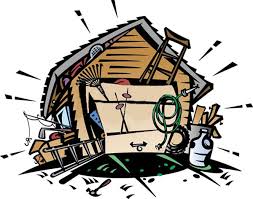
 How to Care for an Elderly Hoarder?
How to Care for an Elderly Hoarder?
When I said yes to the job of caring for my elderly mother, I had no idea I was also saying yes to care for a house that had been equally badly neglected.
This is my Guest Blog appearing on Rita Morgan’s Blog-Not Just the Kitchen created for Baby-Boomer Women. Here is the link to the original Blog appearing on Not Just the Kitchen: http://www.notjustthekitchen.com/care-elderly-hoarder/
Jun 29, 16
By: Stefania Shaffer
Have you ever passed by one of those houses where the crooked garage doors are barely holding themselves together over the heaping bulge behind them?
Then one day, on your usual stroll of the neighborhood, those garage doors are popped wide open for the whole world to see. You shudder and gasp aloud. You don’t want to linger for too long because it is rude to stare, but you silently wonder how someone could live with floor-to-ceiling clutter that has been amassed for decades.
If you are only too familiar with this sight, let me offer you some reassurance that there is a path to purging. When I said yes to the job of caring for my elderly mother, I had no idea I was also saying yes to care for a house that had been equally badly neglected.
Driving up to my childhood home where my mother still lived nearly 35 years later, I see the lawn is no longer green, nor mowed. It resembles something out of the savannah that my father would have tackled in earnest at the first sighting of crabgrass—had he not passed away thirteen years earlier.
When my disheveled, eighty-five year old mother greets me at the door with her warm toothless smile and welcoming hug, I can tell there will be more moments like what Dorothy experienced in Oz when she said to her dog, “Toto, we’re not in Kansas anymore.”
Nothing is recognizable to me.
It’s not like we ever lived with white-glove standards growing up, but we were a tidy family if you didn’t count the mud and blood the brothers were always traipsing in.
But, on this day my childhood home is operating at the highest level of dysfunction. Of five bedrooms, four are being used as attic space where wardrobes from thirty years earlier are sprawled across the floor, mixed in with old blankets and petrified briquettes of cat doo-doo. All I can think to myself is who is going to oversee the gut job needed on this house? Tearfully, I am afraid I already know this answer.
The garage looks worse than what you might imagine.
Even more disconcerting is the pile-up of paperwork saved since my father’s death. My old bedroom is filled with envelopes containing statements stuffed into them, then packed into shoeboxes piled onto the bookshelf, or tucked into drawers, or peeking out from beneath beds.
Depression-era parents. Need I say more? Thank goodness my mother is willing to put her trust into what she calls my good judgment. “Health, Safety, Style” becomes our mantra for the care that will need to go into her—and her home.
Here are the ABCs to beginning any difficult task: Assess, Begin, Carry On.
Assess
Every frontiersman knew to survey the land. What is the kind of stuff piling up, memorabilia or junk? Who will miss it? I feel a sense of responsibility to the other siblings to preserve their trophies, yearbooks, and kinder artwork—theirs to ditch if they so desire.
Begin
Before you can salvage anything, you need a good staging area.
Step 1- De-clutter the garage first.
* Clear out discarded toys, bikes, and seldom used items
* Find the Salvation Army or Goodwill that will pick up
* Recycle nuts, bolts; shift furniture, find the floor, push a broom
* Get rid of rusted shovels and the plethora of old tools
* Clear off every shelf—discard paints and other chemical laden cans legally
* Shred-It will make a house call affordably, taking mere seconds to do what will take you months with your home machine that will jam frequently
Step 2- Create smart centers within your garage
* Laundry station-move an old bookshelf to store supplies
* Errand station—use labeled boxes (library donations, record store, Goodwill, Accountant, etc.) as a reminder of which errands to still run
* Paperwork station—tower plastic crates labeled for archived financial statements. Caution: never throw anything away until you understand what it means to your parent’s financial picture. I found wealth buried in the 85th box.
Step 3-Preserving childhood memories for siblings (3-piece set for each child)
1) 45-gallon crate 37’L 27”H to store small furnishings, trophies, plaques et al
2) Tri-fold board to stack on top of crate for holding Kinder art, or the like
3) Colored document pouch, zippered, 8.5” x 11” for important papers, flash drives, or special letters home saved by parents
Move an old dresser cluttering a bedroom to create new hub for sibling items
Carry On
Your job is not yet over. Paperwork sorting becomes my passion.
Step 4-Active vs. Archive File statements accordingly.
Active is for accounts paid in the past year. Scrutinize each to make sure your elderly parent is not experiencing financial abuse. File current month’s statement at front, older months behind.
Archive older statements from previous years. Keep these only for gleaning how money changed hands through investing or bank accounts.
Cluster 2-3 years of old statements into one lidded plastic crate the size of a bankers box.
Label front as “Archive 2012-2015” Repeat this until all of your bundles are in separate bins.
Once you get a handle on the Active, return to the Archives at your leisure to understand financial history.
Efficient closet makeovers will be the next blog posting here.
About the Author:
Stefania Shaffer, a teacher, speaker, and writer, is grateful her WWII parents raised her to do the right thing. Her second book, the Memoir 9 Realities of Caring for an Elderly Parent: A Love Story of a Different Kind has been called “imperative reading” Funny and compassionate, this is the insider’s view of what to expect from your daunting role if you are the adult child coming home to care for your elderly parent until the very end.


 Did You Know that Many Adult Children Caring for an Elderly Parent Have Very Similar Stories to Tell? Listen in to what callers had to share.
Did You Know that Many Adult Children Caring for an Elderly Parent Have Very Similar Stories to Tell? Listen in to what callers had to share.